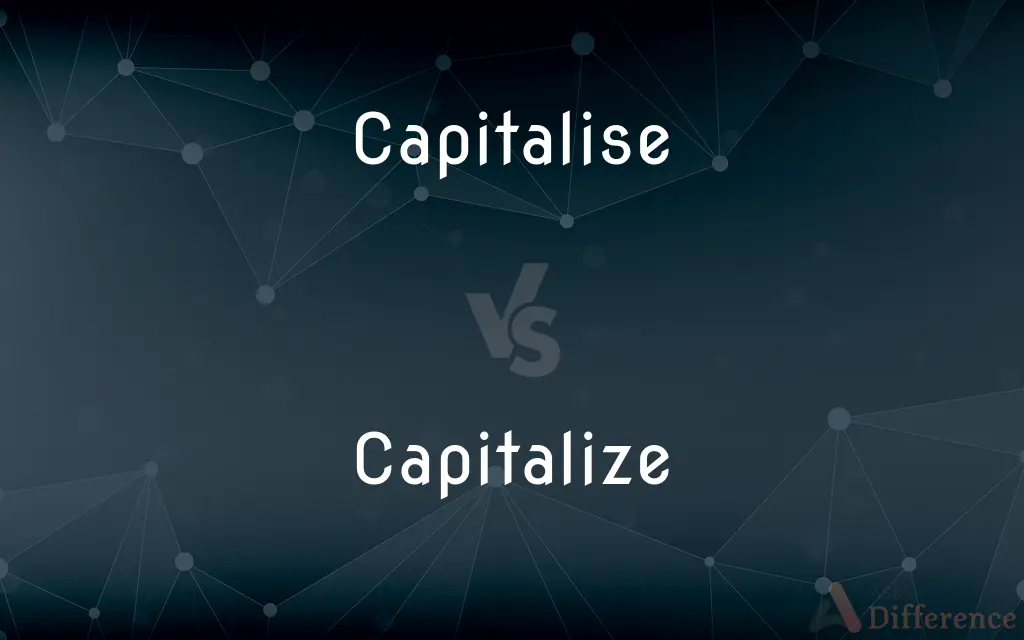Capitalise vs. Capitalize — What's the Difference?
By Tayyaba Rehman — Published on December 11, 2023
"Capitalise" is the British spelling, and "Capitalize" is the American spelling, but both have similar meanings related to making the first letter uppercase or taking advantage of a situation.

Difference Between Capitalise and Capitalize
Table of Contents
ADVERTISEMENT
Key Differences
"Capitalise" and "Capitalize" are two spellings of essentially the same word, differentiated primarily by regional usage. In British English, "Capitalise" is the preferred spelling, while in American English, "Capitalize" is standard. The basic meanings of both words remain the same.
"Capitalise" and "Capitalize" can mean to write or print something in capital letters. For example, in a sentence, we might "capitalise" or "capitalize" the first letter of the first word. Both terms imply the act of using uppercase letters as opposed to lowercase.
Another common meaning of both "Capitalise" and "Capitalize" is to take advantage of a situation. This can be in a financial context, where one might "capitalise" or "capitalize" on an investment opportunity. It denotes seizing an opportune moment to gain benefit.
In addition to the aforementioned meanings, both "Capitalise" and "Capitalize" can refer to the financial term related to funding, specifically the action of funding a business with a combination of debt and equity. In this context, the terms are often used in discussions about the structure of a company's finances.
In essence, while "Capitalise" and "Capitalize" may differ in spelling due to regional preferences, their meanings and applications in language are largely interchangeable.
ADVERTISEMENT
Comparison Chart
Spelling
British English spelling.
American English spelling.
Usage
Commonly used in UK, Australia, and other Commonwealth countries.
Predominantly used in the United States.
Pronunciation
Pronounced similarly in most contexts.
Pronounced similarly in most contexts.
Meanings
To make the first letter uppercase; to take advantage of a situation; funding a business.
To make the first letter uppercase; to take advantage of a situation; funding a business.
Examples
"Capitalise the first letter"; "Capitalise on the opportunity."
"Capitalize the first letter"; "Capitalize on the opportunity."
Compare with Definitions
Capitalise
To take advantage of a situation for benefit.
He tried to capitalise on the market trends.
Capitalize
To provide funding for a business.
Venture capitalists helped capitalize the startup.
Capitalise
To write or print in capital letters.
Please capitalise the names of all the countries.
Capitalize
To convert a periodic income into a capital sum.
The business chose to capitalize its annual revenue.
Capitalise
To consider an expense as a capital expenditure rather than an operational one.
The company chose to capitalise the cost of the new equipment.
Capitalize
To recognize a cost as a capital asset.
We will capitalize the software development costs.
Capitalise
To fund a business through a mix of debt and equity.
They decided to capitalise the company through external investors.
Capitalize
To use as or convert into capital.
Capitalise
To calculate the present value of a future income stream.
The analyst chose to capitalise the company's earnings.
Capitalize
To supply with capital or investment funds
Capitalize a new business.
Capitalise
Standard spelling of capitalize
Capitalize
To authorize the issue of a certain amount of capital stock of
Capitalize a corporation.
Capitalise
Supply with capital, as of a business by using a combination of capital used by investors and debt capital provided by lenders
Capitalize
To convert (debt) into capital stock or shares.
Capitalise
Draw advantages from;
He is capitalizing on her mistake
She took advantage of his absence to meet her lover
Capitalize
To calculate the current value of (a future stream of earnings or cash flows).
Capitalise
Write in capital letters
Capitalize
To include (expenditures) in business accounts as assets instead of expenses.
Capitalise
Compute the present value of a business or an income
Capitalize
To write or print in capital letters.
Capitalise
Consider expenditures as capital assets rather than expenses
Capitalize
To begin a word with a capital letter.
Capitalise
Convert (a company's reserve funds) into capital
Capitalize
To turn something to one's advantage; benefit
Capitalize on an opponent's error.
Capitalize
(transitive) In writing or editing, to write (something: either an entire word or text, or just the initial letter(s) thereof) in capital letters, in upper case.
In German, all nouns are capitalized.
Capitalize
To contribute or acquire capital (money or other resources) for.
Some states require proof that a new venture is properly capitalized before the state will issue a certificate of incorporation.
Capitalize
To convert into capital, i.e., to get cash or similar immediately fungible resources for some less fungible property or source of future income.
If we obtain a loan using the business as collateral, the effect will be to capitalize our next ten years of income, giving us cash today that we can use to buy out our competitor.
Capitalize
To treat as capital, not as an expense.
Capitalize
(intransitive) To profit or to obtain an advantage.
The home team took several shots on goal but was unable to capitalize until late in the game.
Capitalize
To seize, as an opportunity; to obtain a benefit from; to invest on something profitable.
The home team appeared to have the advantage throughout the game, and finally capitalized on their opponents' weakness with just two minutes remaining, scoring several points in quick succession.
Capitalize
To convert into capital, or to use as capital.
Capitalize
To compute, appraise, or assess the capital value of (a patent right, an annuity, etc.
Capitalize
To print in capital letters, or with an initial capital.
Capitalize
To supply capital for (an enterprise), especially by selling capital stock.
Capitalize
Draw advantages from;
He is capitalizing on her mistake
She took advantage of his absence to meet her lover
Capitalize
Supply with capital, as of a business by using a combination of capital used by investors and debt capital provided by lenders
Capitalize
Write in capital letters
Capitalize
Compute the present value of a business or an income
Capitalize
Consider expenditures as capital assets rather than expenses
Capitalize
Convert (a company's reserve funds) into capital
Capitalize
To take advantage of a situation for gain.
She wanted to capitalize on her newfound fame.
Common Curiosities
Which spelling is used in the UK?
"Capitalise" is the preferred spelling in the UK.
Do the words have a financial context?
Yes, they can refer to funding a business or considering an expense as a capital expenditure.
Which spelling is more common in the US?
"Capitalize" is the standard spelling in the US.
Can both terms refer to taking advantage of a situation?
Yes, both "Capitalise" and "Capitalize" can mean to seize an opportune moment for gain.
Does "Capitalise" have other spellings in British English?
"Capitalise" is the standard British spelling.
Are "Capitalise" and "Capitalize" the same in meaning?
Yes, their meanings are largely the same, but they differ in regional spelling.
Can both words be used interchangeably in formal writing?
Yes, but it's essential to maintain consistency throughout the text.
How should I know which spelling to use?
Consider your audience; use "Capitalise" for British readers and "Capitalize" for American readers.
In a global context, which spelling is more accepted?
Both are accepted, but "Capitalize" might be more recognized due to the influence of American media and publications.
Do both words relate to using uppercase letters?
Yes, both can mean to write or print something in capital letters.
How do Canadians spell the word?
Canadians generally use the American spelling "Capitalize."
In the digital age, do spell checkers recognize both spellings?
Yes, but they may flag one as incorrect based on the selected language setting (e.g., British English vs. American English).
Should students learn both spellings?
It's beneficial to be aware of both, especially if writing for diverse audiences or reading international publications.
Are there any differences in pronunciation?
Generally, they are pronounced similarly, though regional accents may introduce slight variations.
Are there any other significant differences between the words?
Beyond regional spelling, the meanings and applications of both words are nearly identical.
Share Your Discovery

Previous Comparison
Plant Vacuoles vs. Animal Vacuoles
Next Comparison
Primary Key in DBMS vs. Unique Key in DBMSAuthor Spotlight
Written by
Tayyaba RehmanTayyaba Rehman is a distinguished writer, currently serving as a primary contributor to askdifference.com. As a researcher in semantics and etymology, Tayyaba's passion for the complexity of languages and their distinctions has found a perfect home on the platform. Tayyaba delves into the intricacies of language, distinguishing between commonly confused words and phrases, thereby providing clarity for readers worldwide.
















































